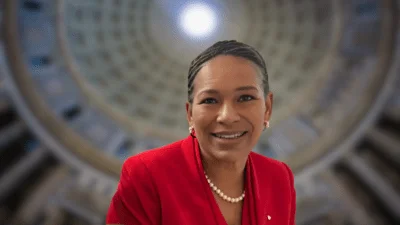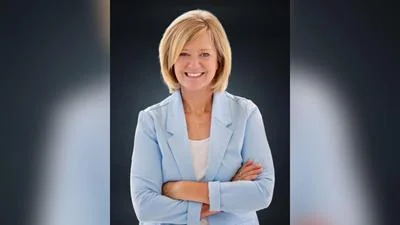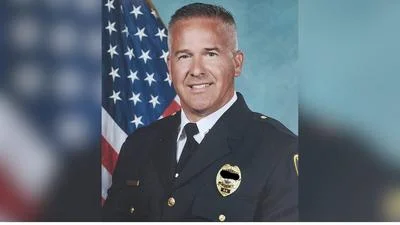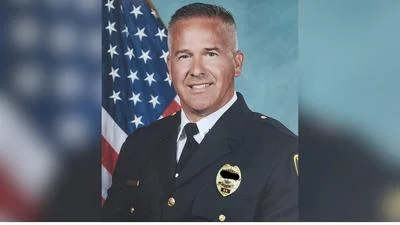Lombard resident Brian Burch addressed the Senate Foreign Relations Committee on Tuesday, April 8, during his nomination hearing for the position of U.S. Ambassador to the Holy See.
Burch, who has spent 25 years as president of CatholicVote and has also served on the board of Seton Academy, a Catholic Montessori school in Villa Park, stressed the importance of the U.S.-Holy See relationship, calling it “unique and vital” due to shared commitments.
“The Holy See as the governing body of the Catholic Church plays a critical and influential role in international affairs,” Burch said. “We can and we must continue our strong partnership while advancing our mutual interests in addressing an array of global challenges, including working to resolve war and conflict in multiple regions around the world, religious persecution, the exploitation of the poor and vulnerable, the scourge of human trafficking, and the defense and promotion of human dignity and prosperity.”
Under Burch’s leadership, CatholicVote has become a prominent organization known for its online presence with over 600,000 newsletter subscribers. Burch is also the co-author of America Catholic Daily Reader and editor of God, Country and Sanity: How Catholics Can Save America, and he has appeared on numerous media outlets.
CatholicVote celebrated Trump’s announcement of Burch’s nomination in December.
“Under Brian’s leadership, CatholicVote has launched influential campaigns exposing violence against Catholic churches and uncovering government overreach targeting Catholics and pro-life advocates,” the group said on InstaGram at the time.
Burch outlined his primary goal if confirmed: to deepen the partnership between the U.S. and the Holy See.
“The moral witness of the Holy See, together with its global influence, make it a key partner for an array of U.S. interests,” he said. “I am confident we can contribute to a more just and peaceful world, reflecting the best of American values and the Holy See's mission.”
Burch is a vocal critic of Pope Francis, accusing the pope of creating "massive confusion" and engaging in a "pattern of vindictiveness." If confirmed, Burch would take on a diplomatic role amid ongoing tensions between the Vatican and the Trump administration.
Given 56% of ballots cast by Catholics in the 2024 election went to Trump, the voting block is important to the administration.
“Let me also assure this committee that I fully understand the distinction between advocacy and diplomacy,” Burch said. “As ambassador, my sole responsibility will be to represent the interests of the United States. I am committed to listening, learning, and engaging with all stakeholders to ensure our policies serve our nation and its partners effectively.”
Burch reiterated his commitment to serving both his country and the critical relationship between the United States and the Vatican.
“If confirmed, I look forward to working with this committee, the administration, and our counterparts at the Vatican to achieve our shared objectives,” he said.
He also acknowledged the current health condition of Pope Francis, wishing him a “full and swift recovery” from his recent hospitalization for double pneumonia, and shared a personal note about his family’s support throughout his journey.
Pope Francis, hospitalized for bronchitis and double pneumonia in February, was released on March 23 after 38 days of care and is now undergoing rest and rehabilitation.
During the nomination hearing, Burch faced questions from Senators about U.S. foreign policy.
Senators from both parties raised concerns about the alignment of U.S. foreign policy with Vatican priorities, particularly regarding humanitarian assistance and the ongoing tensions between the U.S. and China.
Senator Jeanne Shaheen (D-NH) addressed U.S. cuts to foreign assistance through Caritas, the Catholic Church’s charitable arm.
“Stopping USAID abruptly will kill millions of people and condemn hundreds of millions more to lives of dehumanizing poverty,” she said.
Shaheen’s comments came despite recent reports that USAID has funded groups involved in smear campaigns against American journalists and politicians. The agency’s foreign-backed efforts have raised concerns from journalists like Lee Fang, who highlight a loophole allowing the U.S. government to engage in propaganda against domestic critics through third-party intermediaries.
USAID has been accused of funding propaganda efforts throughout the world.
“USAID was funding over 6,200 journalists across 707 media outlets and 279 ‘media’ NGOs, including nine out of ten media outlets in Ukraine,” Wikileaks said on X.
Part of that funding was aimed at domestic propaganda campaigns meant to damage the first Trump presidency. According to Public, USAID's involvement with the Organized Crime and Corruption Reporting Project (OCCRP) helped fuel key elements of the Trump-Russia collusion narrative, including a story cited in the 2019 whistleblower complaint that led to President Trump's impeachment. Public also reported that USAID along with the CIA played key roles in the impeachment.
Shaheen pressed Burch on how he would reassure the Holy See of U.S. commitment to humanitarian aid.
Burch acknowledged the complexity of aligning U.S. foreign policy with the Holy See’s humanitarian efforts.
“I know this is going to be a very challenging issue for myself in this role because of the Holy See's pattern and record of leadership when it comes to humanitarian causes and humanitarian assistance,” he said.
On the issue of foreign aid effectiveness, Burch highlighted the Catholic Church’s role in delivering low-overhead and impactful humanitarian aid, especially through organizations like Catholic Relief Services.
“I think the Holy See, in fact, has been an exceptional partner for the United States,” he said. “Some of the NGOs that perform work are some of the best... and some of the most effective and most impactful programs.”
However, he reaffirmed his support for the Trump administration’s approach to foreign aid.
“The president and I fully support the president and the secretary… the long overdue problem within some of our foreign aid, which is millions if not billions of our dollars have been going to places around the world that are not aligned with United States interests,” Burch said.
He emphasized that U.S. foreign aid needs to focus on places that make the U.S. “safer, stronger, and more prosperous.”
Subsequently, U.S. Sen. Pete Ricketts (R-Neb.) raised concerns about the Vatican’s 2018 agreement with China regarding the appointment of bishops, which had been renewed in 2024.
The Vatican recently announced the creation of a new diocese in partnership with the Chinese Communist Party in China, the Diocese of Lüliang, with Father Anthony Ji Weizhong appointed as its first bishop. This decision came after Pope Francis suppressed the Diocese of Fenyang and redrew diocesan boundaries to align with China's administrative divisions, impacting an area with a Catholic population of approximately 20,000 people.
Burch addressed the concerns, acknowledging that the U.S. has serious reservations about China’s human rights record and stating that the Holy See’s relationship with China is of “immense importance” to the United States.
He emphasized the need for the Vatican to apply “pressure” on China regarding human rights abuses, particularly the persecution of religious minorities, including Catholics.
“I do not believe the church should cede or surrender to any government, China or otherwise, the selection of their bishops,” Burch said.
Burch went on to express his strong belief in the importance of the Holy See maintaining diplomatic relations with Taiwan.
“I understand this to be extremely important because China’s ambitions... will likely be tempered by the posture of the rest of the world and the Holy See,” he said.
He promised to work with the Vatican to ensure it maintains this critical relationship.
In another exchange, Senator Rick Scott (R-Fla.) raised concerns about the Vatican's perceived lack of urgency on the issue of hostages held by Hamas in Gaza.
Burch noted that the Holy See has been vocal in advocating for peace in the region and pointed to Pope Francis' personal efforts to intervene, even during his hospitalization.
“The Vatican has been very clear,” he said.
Burch added that the Holy See could play a key role in “delivering the necessary moral urgency” to resolve the conflict.
Burch also expressed gratitude for his family during the hearing.
“I would like to take a moment to express my deepest gratitude to my wife, Sarah, whose unwavering support and love has been my anchor through this journey,” Burch said. “And to our beautiful nine children, including my daughter-in-law and my first grandchild, who remind me every day how blessed I am.”
Reflecting on his roots, Burch shared his background growing up in Phoenix, Ariz., where he attended Catholic schools and spent summers working alongside migrant workers.
“My family is the story of the American dream,” he said. “My mom and dad married early and started with nothing but the only thing that matters, their faith and love.”
He also paid tribute to his late father, who passed away last year.
“Last summer, I lost my father to cancer at the early age of 69,” he said. “I know he's looking down on me this morning and smiling. You were right, Dad. In America, anything is possible, including the possibility that his son could be nominated by the President of the United States to serve as the U.S. Ambassador to the Holy See.”





 Alerts Sign-up
Alerts Sign-up